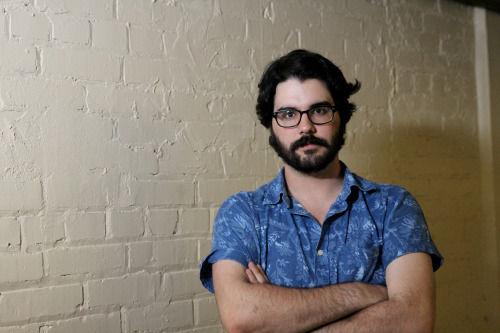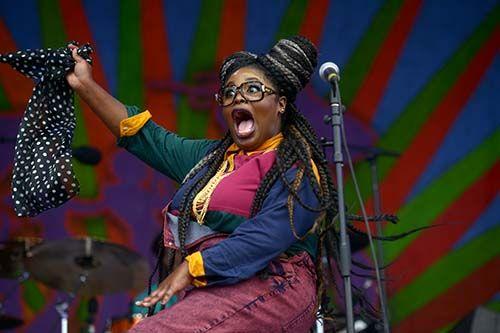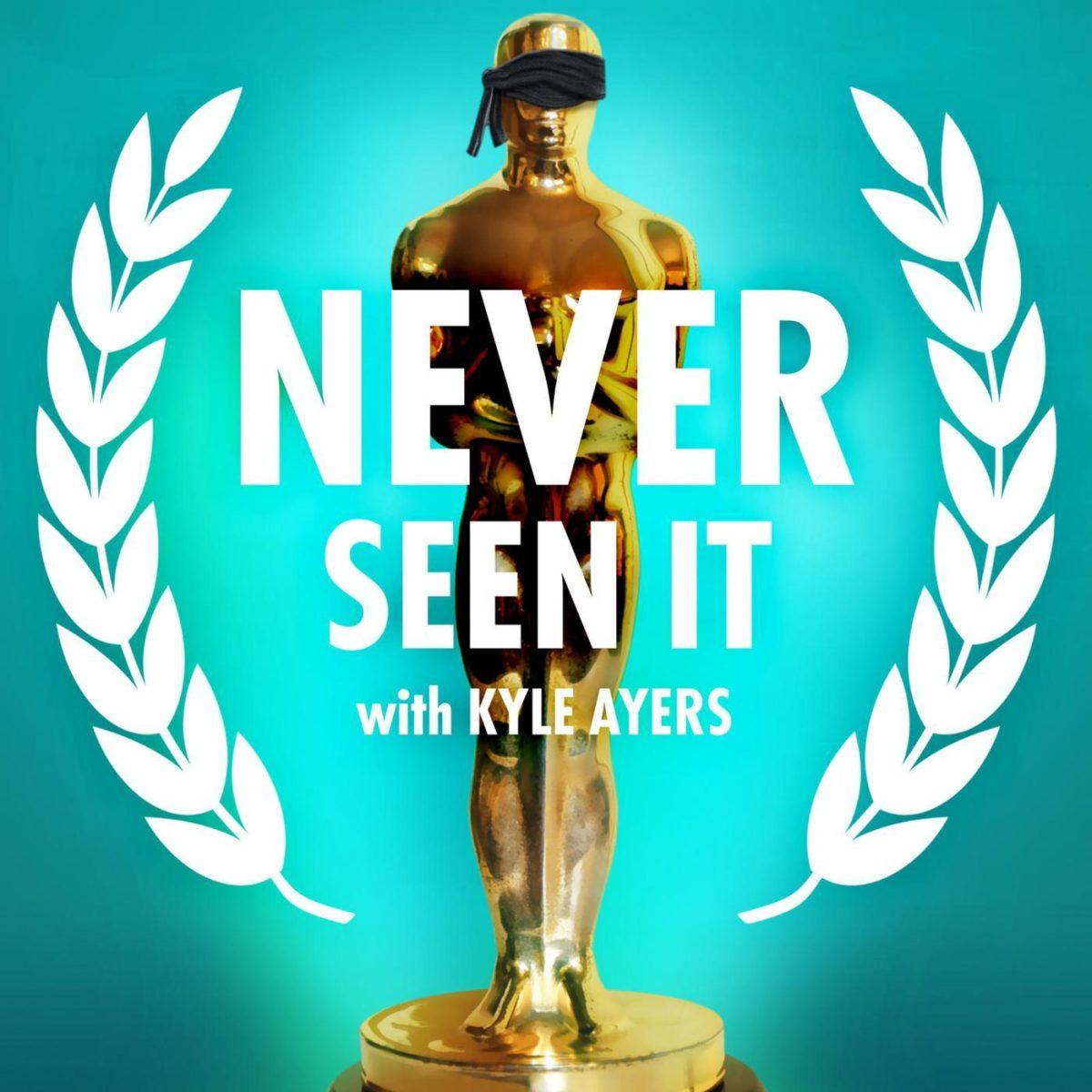He leans back in his chair as he scrolls through his phone, the squeaking of the springs slicing through the silence. After a few more moments of reticence, the air conditioner whirs to life behind us as if it heard our pleading prayers. As the afternoon sun cuts through the room like a gleaming blade, Cole Barranco waits patiently in the editing room inside of the music and dramatic arts building.
Barranco, 20, at first glance doesn’t seem like a budding director/producer who is driven, creative and knowledgeable of the craft. His dark chocolate hair shields the sides of his face and stops at his shoulders in soft waves accompanied by a full beard and mustache. A red baseball cap sits tightly on his head, as if it’s clinging to his mind if its life depended on it.
However, to the trained eye, Barranco fits the classic profile of how Hollywood’s most beloved directors represent themselves in set of their latest projects. Hunched forward and quiet, observing his surroundings.
Directors are born observers. They have the ability to step outside of themselves and see the world with a new pair of eyes, and yet, directors still find room to draw inspiration from their own life and lessons. Anything can become a source of inspiration.
All of these characteristics are perfectly coifed within Barranco and can be seen unfolding during his introduction to directing actors in film class.
In class, Barranco is eager and inviting. He has his own special spot in the far corner in the class, surrounded by more fellow seasoned filmmakers and actors. When formulating a scene, he uses his familiar green notebook, undoubtedly filled with origin stories and objectives for his characters.
However, his origin story is just as interesting.
Born in New Orleans, his father, now retired, worked as a financial analyst for Chevron while his mother manages her own business operating background checks and paternal and drug testing.
“She works out of an old yoga studio,” Barranco said. “It’s like a one hundred year old building. I think they made coffee in it at one point and it was a convenient store at one point, and then we lived in it for a few months.”
After Hurricane Katrina, Barranco and his family rented it out and lived in the building before his mother decided to buy the place.
“We lived in Texas for a few months and then we came back,” he clarified.
Every director has had that golden moment in life where they decide to take on the path towards film and directing. For Barranco, now a junior, the moment happened pretty recently.
“I had wanted to do production design for a while, I even wanted to do sound for a while,” he stated. “I was sure that I wanted to do directing photography because I do photography work and I love cinematography.”
As it turns out, Barranco just needed to get his feet planted on the right film set.
“However, prepping to do the film that I’m working on now, “Whiskey Gun and Death,” made me realize that I want to do this. Maybe this is something I can be pretty good at.”
Every director has someone they looked up to, someone who inspired them to step into one of the most competitive arenas in the career field. After all, the world of directing is a cut-throat occupation, having some sort of guiding light can become a necessity. For Cole Barranco, the answer is as clear as day.
“Quentin Tarantino, hands down,” he said.
Barranco even takes it a step further by expressing that his love for Tarantino transcends into his current film project. “The film that I’m working on now is pretty much an homage to him and a little bit of Scorsese as well.”
Tarantino’s way of storytelling is what has Barranco hooked. “I’m so fascinated by him and how he tells stories.”
However, picking his favorite film doesn’t come as easy.
“I’ve been asked that question for years,” he started, chuckling. After a few more moments of pondering, he decided to pick a selection of films rather than one in particular.
“All the Tarantino films, just as one big collection and then the Lord of the Rings trilogy, I’m super passionate about that series. But there’s so many, it’s hard to narrow it down to just a few.”
Whether a director should hone in on his craft in film school or out in the industry is still up in the air. For Tarantino, film school was just a distraction. He would boast to film students that he didn’t go to film school, but instead went to film. Scorsese, however, graduated from New York University with a degree in film. Scorsese has expressed in the past that the excitement of a young film student is an exciting experience to witness.
Barranco chose the film school route, but not immediately.
“At first, I came here hoping to be an architect, but then at orientation, I knew that I wasn’t going to get into the program because my ACT score was relatively low,” he confessed. “So I decided to go to set design for film.”
Barranco joined the film and theatre department on a whim.
“So during orientation, I switched groups. For the first semester I did design and tech and actually dabbled a bit with the props and stuff like that for some of the theatre shows.”
Starting as a beginner in the theatre department, Barranco knew his heart was with film. Unfortunately, at the time, LSU didn’t have a film department off the ground. In fact, the film department didn’t come to life until indie-film director and professor Joshua Overbay stepped in and brought the presumably ignored program to life.
Cole Barranco didn’t let the lack of educational resources stop him. With only a few years of theatre and film school under his belt, Barranco prides himself on the hefty list of projects that he has worked on. The list he has consists of over fifty short film projects and a variety of extra work in full-length feature films.
“I’ve directed three of my own,” he said, smiling wide. “I’ve written one and currently co-writing one.”
Many of the projects are student projects and even a few music videos pop on the lengthy list.
Things get a little more candid when Barranco confessed what it was like to co-direct his first official short film, “Leisure Time.”
“It was weird,” he confessed. “My first director of photography wrote the film and he had a lot of input which I was totally fine with. He was a really smart dude.”
Barranco didn’t mind the fact that his first experience as a director wasn’t a solo one. “It was a great way to get a way to step into it.”
“Leisure Time” went on to win an award for best comedy/musical from the Take One LSU Film Festival and three Utie Theatre awards for best acting, best writing and outstanding film.
“Which was crazy because I didn’t think it would,” he confessed, laughing.
Every new filmmaker is bound to make mistakes and it’s easy for a director to be test their limit, especially with a whole stream of possibilities before them. Barranco is guilty of doing both.
Barranco tried rushing through his third film just to see how fast he can go and deliver, but to his dismay, things didn’t go as planned.
“It’s not the best idea because it doesn’t look the best,” he said. “Well, some of it does.”
Thankfully, the film was pretty simple.
“It was about two guys fighting over a remote.”
Like all mistakes, they’re not useful until a lesson is learned from them.
“Now I’ve taken a huge leap into a different direction with preparation, working with the writers and developing a story together and being very precise on how I cast.”
The most crucial part in filmmaking is figuring out who will bring the characters to life. After a thorough analysis of the story and characters, a certain mold formulates, teasing the director and their team of producers and forcing them to go on an exhaustive hunt for the perfect actor.
Barranco has had a lot of experience searching for the perfect actors to fill that mold, which in turn, helped him figure out how to make his future films better.
“I want to make it look like a film not so much like a student film, which is a big thing in the department. A lot of people cast college kids and it doesn’t do it for me unless I need a college kid.”
Cinema’s ultimate goal is to tell a story. To entertain the audience and give them an otherworldly experience that will lead them to reflect on their own lives in some way. The art of storytelling is a gift, a gift that Barranco isn’t sure he’s received yet.
“I don’t know if I’ve done that yet,” he said, sheepishly. However, he is well aware of what types of storytelling attracts him and which ones turn him off.
“I’m not a big fan of the experimental, where things don’t make sense. I like the narrative format of storytelling. However, I like how Tarantino does it with the nonlinear form of storytelling, where you start from an event that hasn’t happened yet and don’t know much about the event.”
LSU film professor Joshua Overbay always emphasizes the importance of a good script analysis. This is where the director will find the ultimate objective and circumstance for each character and uncover the subtext within each line. Overbay recommends to allow yourself time alone with the script to better understand it. Barranco, however, has another form of advice for crafting the perfect analysis.
“Help write it,” he said.
A few more seconds tick by before he decided to elaborate.
“I’m not a writer, I can help with story and characters and stuff like that but I could never get everything down on the page.”
Working on the script with someone else compared to someone else writing it all and directing it. “I feel that I have more of a drive to really get this done.”
Filmmakers are also great communicators, not with just the script itself but with the actors. Making a movie is an extensive collaborative project and most of the collaboration rests on the shoulders of the director and his actors. However, communicating to actors is not as easy as it sounds and Barranco can attest to that.
“I try my best because I can’t always get right the word out and I’ll try to explain where I’m headed,” he said. “Normally, like the pass scene that I did for my midterm, [the actors] kind of picked up on it and put it into words.”
He expressed how hard communicating a scene to the actors can be when he witnesses it being done by someone else first.
“Trying to go back to all that you have in your head and picking the right thing to say even when you have it written down, you might have something else,” he said. “Watching as a scene unfolds I go ‘oh there’s a great thing that they can tweak here.’”
But Barranco knows how fundamental communication on set is.
“If you can’t communicate with your actors than what’s the point?”
No Hollywood set will be complete without its Holy Grail. The vessel that can transform a scene with a new angle and is the one thing differentiating theatre from film: the camera. Available in a wide range of styles and models, Cole Barranco narrows it down to one perfect camera.
“Everyone goes for the ARRI Alexa, that’s a top of the line,” he said. “They’re the $50,000 cinema cameras, I’ve never even played with one.”
But Barranco is more than pleased to work with the equipment supplied by the film department.
“But what we have here, the Canon C100 I think is a beautiful camera.”
Directors are also good businessmen. In a highly competitive industry such as Hollywood, the more control a director has on their projects the better. Great directors and actors like Steven Spielberg and George Clooney can all confirm this as they have all started production companies of their own to have more creative freedom.
Barranco’s leap into this realm of the film industry happened unexpectedly.
“Abstrance is an evolved production company that happened in my entertainment technologies course,” he clarified.
“I actually had my own,” he started. “My group was Horse Set Productions, which lasted not very long but the other one was Abstract Minds and Brandon Bruno pretty much spearheaded it.”
Abstract Minds was already ahead of the game and releasing content. One day during a casual meeting, Bruno pitched the idea of starting over with a new production company. Eventually, Abstrance Films was born with the intention of producing and selling their own content and hitting the independent film circuit.
“It’s making short right now, we’re trying to figure out how everyone works together at this point,” he said.
Abstrance is filled with a variety of creators who bring their own flavor to the table, which is what makes Abstrance so great; the limit to the art they create is nonexistent.
For himself, Barranco hopes to become a director who creates content that tells great stories and are what people want to see.
“I just want to create content that people appreciate,” he said, smiling wide.
The gleaming blade of light hits the center of the room, basking Barranco in the warm noon sun. As the air conditioner shuts off again, sealing the room in silence and the impending return of heat, Cole Barranco leans forward and unfolds himself from the chair. At that moment there’s a flicker in his eyes, a brief indication of the ambition hidden within him and a small smile spread on his face that never seemed to fade away.
Directors are born not made. For some directors, the fire ignites within them earlier in life while for others, the flicker hits unexpectedly causing a sudden shift in plans and life goals.
While the latter may be true for Cole Barranco, the flame is still there and the evidence of his ambition is clearly seen in his lengthy lists of credits. As Barranco packs up his things to head to class, he takes out his familiar green notebook, undoubtedly already planning his next masterpiece.
Cole Barranco Profile
By Bianca Smith
April 28, 2016

Kaitlyn Graff







